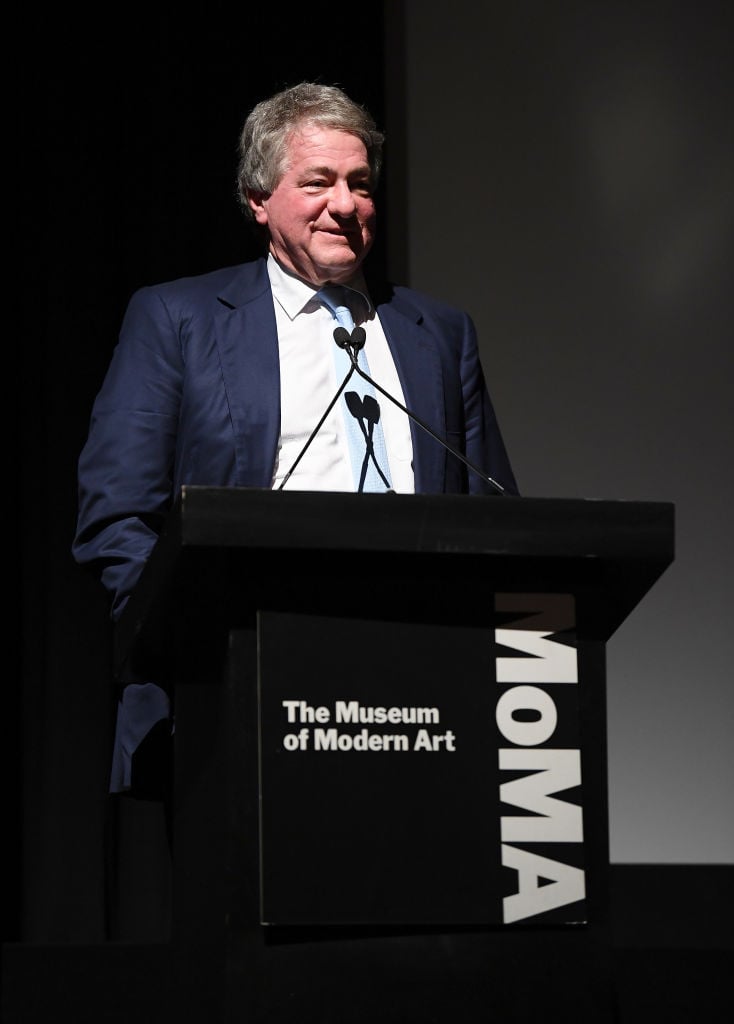
Artwork and a purported $1 billion private art collection are a major focus of the 16-page letter that U.S. Senator Ron Wyden, chairman of the Senate Finance Committee, sent to embattled investor and collector Leon Black late last month.
The committee is investigating Black’s financial dealings with Jeffrey Epstein, the convicted sex trafficker who died by suicide in a downtown Manhattan jail in 2019. The letter, which is dated July 24, requests highly detailed information on transactions between Epstein and Black, the former Museum of Modern Art chairman.
“As you are aware, the Committee is investigating the $158 million in payments you made to Epstein for services related to a variety of tax and estate planning matters. In particular, the Committee seeks information on Epstein’s participation in structuring trusts and other complex transactions designed to avoid federal gift and estate taxes on as much as $2 billion in wealth transferred to your children,” the letter reads. The Committee is also asking for information regarding Epstein’s “extraordinary compensation scheme, which involved amounts that far exceeded those paid to other professional advisors” involved in Black’s tax and estate planning.
The request highlights several instances where the committee believes Black has not been forthcoming with requested information.
A representative for Black told Artnet News via email: “Mr. Black has cooperated extensively with the Committee, providing detailed information about the matters under review. The transactions referenced in the Committee’s letter were lawful in all respects, were conceived of, vetted and implemented by reputable law firms and tax and other advisors, and Mr. Black has fully paid all taxes owed to the government.”
The most pointed attention on art and related transactions comes at the close of the letter, where Wyden notes that, on August 1, 2022, Black’s outside counsel “indicated that Epstein provided substantial advice related to your private art collection, which is worth over $1 billion,” in a briefing with the committee. “This advice reportedly included helping you form a new art partnership as well as assistance in connection with the sale of certain pieces of artwork.”
Senator Wyden went on to ask what the purpose of the art partnership formed with Epstein’s assistance was, as well as the specifics of his assistance. He asked for details regarding any art loans that involved Epstein as well as the specifics of Epstein’s role.
He also asked for a list of “like-kind” exchanges involving art pieces valued at over $1 million. So-called 1031 exchanges were formerly available to art collectors—and heavily favored by art flippers—that allowed them to avoid paying capital gains taxes on profits from the sale of art by rolling the proceeds into another investment of the same type or “like-kind.” Congress killed the provision as it applied to real property, including art, in early 2018.
For the 1031 exchanges, Wyden asked for a detailed description of the tax benefits obtained through the execution of such transactions. Lastly, he asked for a list of art sales valued at over $1 million that Epstein assisted Black with.
An earlier subpoena from the U.S. Virgin Islands issued in its Epstein investigation in late 2020, referred to a legal decision regarding an entity called CDECRE ARTWORK EAT LLC that was delivered in New York State’s Division of Tax Appeals in March of 2020. The eight-page ruling describes transactions regarding two works by Paul Cézanne and one by Pablo Picasso, as well as an unidentified “petitioner” for the LLC (presumably Epstein), who reported a total value of $139 million for the three works.
Denise N. George was the attorney general in the U.S. Virgin Islands when that and other subpoenas regarding art were issued in the Epstein investigation. However, according to the Times, George was fired by the governor of the U.S. territory—Albert Bryan Jr.—on New Year’s Eve last year, just days after her office sued JPMorgan Chase in connection with its financing and banking activities with Epstein.
Wyden’s letter to Black came just days after it looked like Black had cleared a major legal headache off his plate when the New York Times reported that he had agreed to pay $62.5 million to the U.S. Virgin Islands in January of this year in order settle any claims stemming from the territory’s three-year investigation into Epstein. The Times reported that the previously undisclosed agreement, which it obtained a copy of via a public records request, came after the Virgin Islands reached a $105 million settlement deal in November 2022 with Epstein’s estate.
A recent investigation by Air Mail looked at all the reasons why the finance committee might be looking so closely at Black, the former chairman of private-equity behemoth Apollo Global Management. A former prosecutor who was not identified by name told Air Mail: “It’s ballsy of Black to refuse the Senate,” adding that if he refuses to comply, the Senate could possibly compel him to comply via subpoena.
Wyden has reportedly given Black a September 1 deadline to hand over the requested documentation.